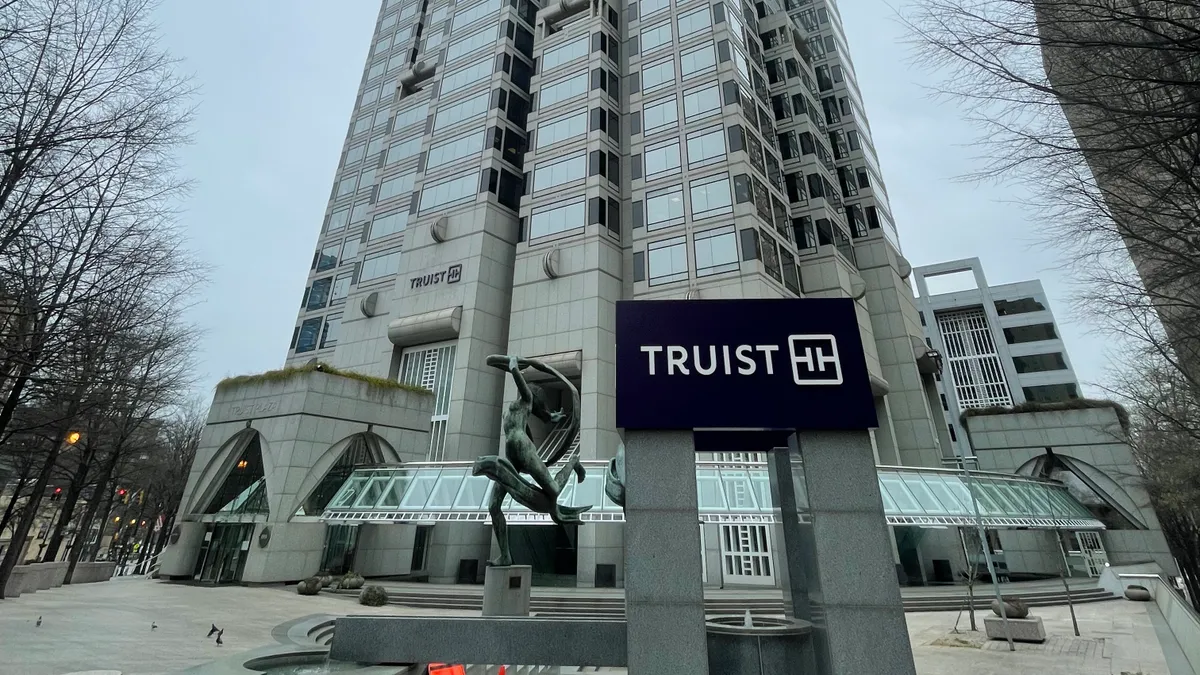News coverage can be fickle. The cycle is fleeting. Audience attention spans can be short. And if you’re a global systemically important bank, more than one newsworthy development involving your company might surface in a 24-hour span. It’s hard to know which stories might catch fire.
No fewer than three stories involving Wells Fargo-related legal developments broke between last Thursday and Friday, and it’s interesting — if a little predictable — to see which one, overwhelmingly, caught that fleeting attention.
An employee sued Wells Fargo on Thursday, claiming the bank improperly denies overtime pay to its senior premier bankers.
Separately, Wells Fargo reached a settlement, announced Friday, with workers at a Hillsboro, Oregon, call center who claimed managers improperly removed pro-union materials.
And finally, the man who served as Wells Fargo’s CEO in the immediate aftermath of its 2016 fake-accounts scandal is suing the bank for $34 million, claiming Wells reneged on verbal promises to pay out his long-term compensation and caused him “emotional distress.”
Regular readers of banking news likely saw more coverage of Tim Sloan’s $34 million quest, right? It ticks a lot of boxes: Sloan’s one-time position as CEO of a massive bank gives him rock-star status. And who doesn’t want to read about rock stars? Especially one with a redemption narrative. Sloan “bore the brunt of public criticism — much of it directed at Wells Fargo policies and practices that predated his tenure as COO or CEO,” his lawyers wrote. Translation: “Don’t be mad at Sloan for the fake-accounts scandal. Be mad at Wells Fargo.”
Wells Fargo had a good sense on which of last week’s legal stories would catch attention. For one, it released a statement in connection with the Sloan suit. “Compensation decisions are based on performance, and we stand behind our decisions in this matter,” a spokesperson of the bank said, according to the Financial Times.
To be fair, Wells Fargo commented on the Oregon story, too. “We are pleased to have resolved this matter and we continue our commitment to our employees’ rights under the National Labor Relations Act,” a Wells Fargo spokesperson told Bloomberg Law.
Unionization connections
It should be noted also that both of the non-Sloan stories are connected to the effort among some Wells Fargo employees to unionize. The plaintiff in Thursday’s overtime lawsuit is Sabrina Perez, a pivotal figure in the movement to establish a union presence at a Wells branch in Albuquerque, New Mexico.
Perez is seeking unspecified damages and legal costs in connection with Thursday’s suit, which claims Wells Fargo improperly classifies its senior premier bankers (that’s Perez’s job title) as management-level employees — thus, exempt from overtime pay.
Wells Fargo “has no valid basis to deny” its senior premier bankers overtime because employees with that job title “have little or no discretion,” states the lawsuit, filed in the U.S. District Court for the Northern District of California.
Wells Fargo requires its senior premier bankers to use software that provides them with scripted questions and creates a list of possible products that may match the needs of the customer to whom they’re speaking, the lawsuit states.
In addition, the bank “saddles Senior Premier Bankers with additional nonexempt work” such as executing banking transactions and customer service “normally done by Tellers and Personal Bankers … because Wells Fargo systematically understaffs its branch locations,” the lawsuit asserts.
Perez leaned on that narrative last month, too — telling The Wall Street Journal that she and her colleagues began talking seriously about unionization because bankers in her branch were pulling double duty as tellers. However, she said at the time, when workers raised their concerns to management, they were told nothing would be done.
“The executives don’t have to deal with the consequences of their decisions in a direct sense, but we do,” she said.
News overload
Wells Fargo declined to comment to MarketWatch regarding Thursday’s overtime suit. But Saul Van Beurden, the bank’s CEO of consumer and small-business banking, told The Wall Street Journal last month that Wells Fargo has “reduced the required workdays for those in many of our branches, and increased staffing levels in branches where needed to help support our employees and ultimately our customers.”
“Companies like Wells Fargo should know better than to withhold overtime pay from workers like Ms. Perez," Michael Scimone, a partner at Outten & Golden who is representing Perez, told Reuters in a statement Thursday.
It’s hardly the first time one story has overrun another — pertaining to the same bank — during the same news cycle. Observers need only look back to September 2022, when, coincidentally, Wells Fargo agreed to pay $94 million to settle a class-action lawsuit alleging the bank automatically placed mortgage borrowers into forbearance if they notified the lender, toward the start of the COVID-19 pandemic, that they were experiencing financial distress.
Less than 24 hours later, the Labor Department announced that it, too, agreed to a payout from the bank — to the tune of $145 million to settle an investigation into allegations that a 401(k) plan for Wells Fargo employees overpaid for the bank’s preferred stock.
As for Friday’s Oregon story, Wells Fargo agreed, under the settlement, to post a notice outlining workers’ organizing rights in the Hillsboro call center. The bank also agreed to email the notice to workers, Bloomberg Law reported.
Incidentally, Wells Fargo recently laid off roughly 300 workers at the Hillsboro location and is shutting down another call center in the state, Debbie Warren, a Hillsboro worker who filed an unfair labor practice claim against the bank, told Bloomberg Law. Workers from the closing call center will now work out of Hillsboro center, she said.



















